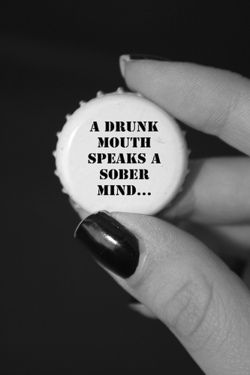Have you ever noticed how conversations can take unexpected turns when a few drinks are involved? It’s as if the usual social filters fade away, allowing for more honest and sometimes surprising exchanges. This phenomenon has been captured in the popular phrase “drunk minds speak sober thoughts,” suggesting that alcohol can loosen inhibitions and lead to candid expressions of truth, even if they are unconventional or unexpected.
This article delves into the intriguing relationship between alcohol consumption and self-expression, exploring how inebriation can unlock unfiltered insights and reveal truths that might otherwise remain hidden. We’ll examine the psychological mechanisms behind this phenomenon, analyze the nature of these “sober thoughts” revealed under the influence, and consider the implications for personal growth and understanding.
Drunk Minds Speak Sober Thoughts
The idea that drunk minds speak sober thoughts is a fascinating paradox. On the surface, it seems counterintuitive – how can intoxication lead to clarity and insight? However, when we consider the effects of alcohol on brain function, the connection becomes more apparent. Alcohol acts as a depressant, slowing down neural activity and reducing inhibitions. This can lead to a loosening of social constraints and a willingness to express thoughts and feelings that might otherwise be suppressed.
While it’s important to note that excessive drinking can impair judgment and lead to irrational behavior, moderate alcohol consumption can sometimes facilitate a more open and honest form of communication. When the usual filters are lowered, individuals may feel more comfortable sharing their true opinions, fears, or vulnerabilities. This can create a sense of vulnerability and authenticity in social interactions, fostering deeper connections and understanding.
Unfiltered Insights

One of the most intriguing aspects of drunk minds speak sober thoughts is the potential for unfiltered insights. When we are sober, our thoughts are often filtered through layers of societal norms, personal biases, and self-consciousness. However, when alcohol loosens these inhibitions, we may access a more primal and authentic way of thinking. This can lead to surprising realizations about ourselves, others, and the world around us.
For example, someone who typically avoids expressing their feelings might find themselves opening up to a friend about their anxieties or insecurities while under the influence. This newfound honesty can be cathartic and lead to personal growth. Similarly, individuals may gain unexpected clarity on complex issues or relationships when their usual thought patterns are disrupted by alcohol.
Alcohol and Inhibitions
The role of inhibitions in shaping our thoughts and behaviors is undeniable. Societal expectations, cultural norms, and personal experiences all contribute to the filters we use to navigate the world. These inhibitions can be both beneficial and detrimental. They help us maintain social order and avoid harmful actions, but they can also stifle creativity, self-expression, and genuine connection.
Alcohol’s ability to lower inhibitions can therefore be seen as a double-edged sword. While it can lead to unfiltered insights and greater honesty, it can also result in impulsive behavior and regrettable decisions. The key lies in moderation and awareness. Consuming alcohol responsibly allows for the potential benefits of loosened inhibitions without succumbing to its negative consequences.
Candid Expressions of Truth

A drunk mind speaks sober thoughts often manifests as candid expressions of truth. When social pressures are lessened, individuals may feel more comfortable sharing their genuine opinions, even if they differ from the prevailing sentiment. This can lead to more honest and direct conversations, fostering a sense of authenticity and vulnerability.
However, it’s important to remember that these candid expressions should be treated with sensitivity. While honesty is valuable, it’s crucial to consider the context and potential impact of our words. Drunk confessions should not be taken as absolute truths or used to manipulate or hurt others.
Unexpected Truths
Perhaps the most intriguing aspect of drunk minds speak sober thoughts is the revelation of unexpected truths. These insights often come in the form of realizations about ourselves, our relationships, or the world around us that we might have otherwise overlooked.
These unexpected truths can be profound and life-changing, prompting us to reevaluate our beliefs, priorities, and actions. They can also serve as a catalyst for personal growth and self-discovery.
Conclusion
The phrase “drunk minds speak sober thoughts” captures a complex and fascinating phenomenon. While alcohol’s effects on the brain can be unpredictable, moderate consumption can sometimes lead to unfiltered insights, candid expressions of truth, and unexpected realizations.
It’s important to approach this concept with caution and awareness, recognizing both the potential benefits and risks associated with alcohol consumption. Ultimately, the key lies in responsible drinking and mindful self-reflection. By understanding the dynamics at play, we can navigate the complexities of drunk minds speak sober thoughts and harness its power for personal growth and deeper understanding.



